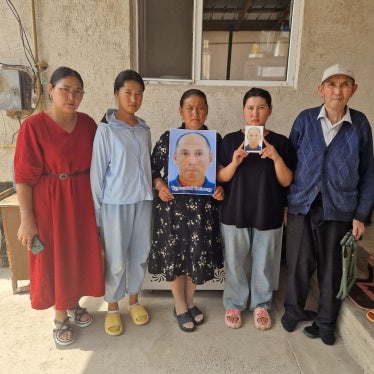(New York) - On the third anniversary of the killings of protestors in Tak Bai the Thai government has yet to bring any of the responsible police and military personnel to justice, Human Rights Watch said today.
On October 25, 2004, security personnel from various army and police units were mobilized to disperse Muslim protesters in front of a police station in the Tak Bai district in the southern province of Narathiwat. Seven protesters were shot dead on the spot, while 78 others were suffocated or were crushed to death as they were being transported to an army detention facility in Pattani province. Some 1,200 people were held in army custody for several days without appropriate medical attention. As a result, many protesters suffered severe injuries that required amputation of their limbs.
“The Tak Bai killings were a truly shocking event, yet there has been no criminal prosecution despite overwhelming evidence,” said Brad Adams, Asia director at Human Rights Watch. “The Thai government has repeatedly promised justice for the Tak Bai victims and the local community. The government has completely failed to deliver.”
The government-appointed fact-finding committee led by Parliamentary Ombudsman Pichet Soontornpiphit concluded on December 17, 2004 that the methods used in dispersing the protesters – including the firing of live ammunition and the use of army conscripts and rangers who lacked experience in dispersing protesters – were inappropriate and not in conformity with established international guidelines and practices. In addition, the committee also found that the commanding officers failed to supervise the transportation of protesters in custody, leaving the task to be performed by inexperienced, low-ranking personnel.
According to the fact-finding committee, three senior army officers were identified as having failed to properly monitor and supervise the military’s operations, leading to the deaths and injuries of Muslim protesters. The officers named were Lt-Gen. Pisarn Wattanawongkiri (then-commander of the Fourth Army Region), Maj-Gen. Sinchai Nutsatit (then-deputy commander of the Fourth Army Region), and Maj-Gen. Chalermchai Wiroonphet (then-commander of the Fifth Infantry Division). However, attempts by families of the victims to bring to justice those responsible for the deaths have been undermined by delays in the postmortem inquest. Meanwhile, the government of Prime Minister General Surayud Chulanont – which promised to correct Thaksin Shinawatra’s mistakes in the southern border provinces – has failed to ensure that the Attorney General’s Office pursue criminal cases against those security personnel responsible for the deaths and injuries of Tak Bai protesters.
“Prime Minister General Surayud apologized for the Thaksin government’s failed policies in the south and said that bringing justice would be one of his top goals in office,” said Adams. “His failure to do so shows just how entrenched impunity for soldiers and police is in Thailand.”
Human Rights Watch said that since the coup against Thaksin Shinawatra in September 2006 there have been more than 20 cases of alleged extrajudicial killings, torture, and excessive use of violence committed by security personnel – from regular and paramilitary units – against Muslims in the south. An independent committee was set up by the Fourth Army Region in June 2007 to investigate these allegations. The committee promised to bring those responsible to justice. But thus far the committee has done nothing more than hold a couple of procedural meetings.
The Thai authorities have provided financial compensation to some Tak Bai victims and their families, as well as victims of other state-sponsored abuses. However, Human Rights Watch stated that compensation is not enough.
“Giving money to some victims does not free Thai authorities from their responsibility to prosecute those responsible for unlawful killings, torture, and other abuses in the south,” said Adams.
Human Rights Watch is deeply disturbed by the killing this month of Ma-usoh Malong, the husband of Yaena Solaemae, a famous Muslim human rights defender who has been closely involved in the campaign for justice for the Tak Bai victims. On October 10, 2007, unidentified gunmen shot dead Ma-usoh Malong near a tea shop close to his house in Praiwan subdistrict of Tak Bai district. Eyewitnesses told Human Rights Watch that the gunmen who shot Ma-usoh came in a green pickup truck and used M-16 assault rifles. Ma-usoh and Yaena Solaemae had eight children. Yaena Solaemae received an award from the National Human Rights Commission in 2005 for her work.
On October 20, 2006, Muhammad Dunai Tanyino, a 40-year-old village headman, was shot dead near his home in Paiwan subdistrict of Tak Bai district, Narathiwat province. Muhammad Dunai’s murder reportedly came after he sought to bring some of the Tak Bai victims and their families to meet the Fourth Army Region commander.
Human Rights Watch called on the Thai authorities to initiate a prompt, impartial, independent and effective investigation into these cases. These killings have further undermined the confidence of the local population in the ability of the Thai authorities to provide justice for serious abuses.
“The problems of Tak Bai are the problems of the south, where government impunity has been institutionalized,” said Adams. “By denying justice, the government is alienating local Muslims and making them easy targets for indoctrination and recruitment by separatist militants.”





